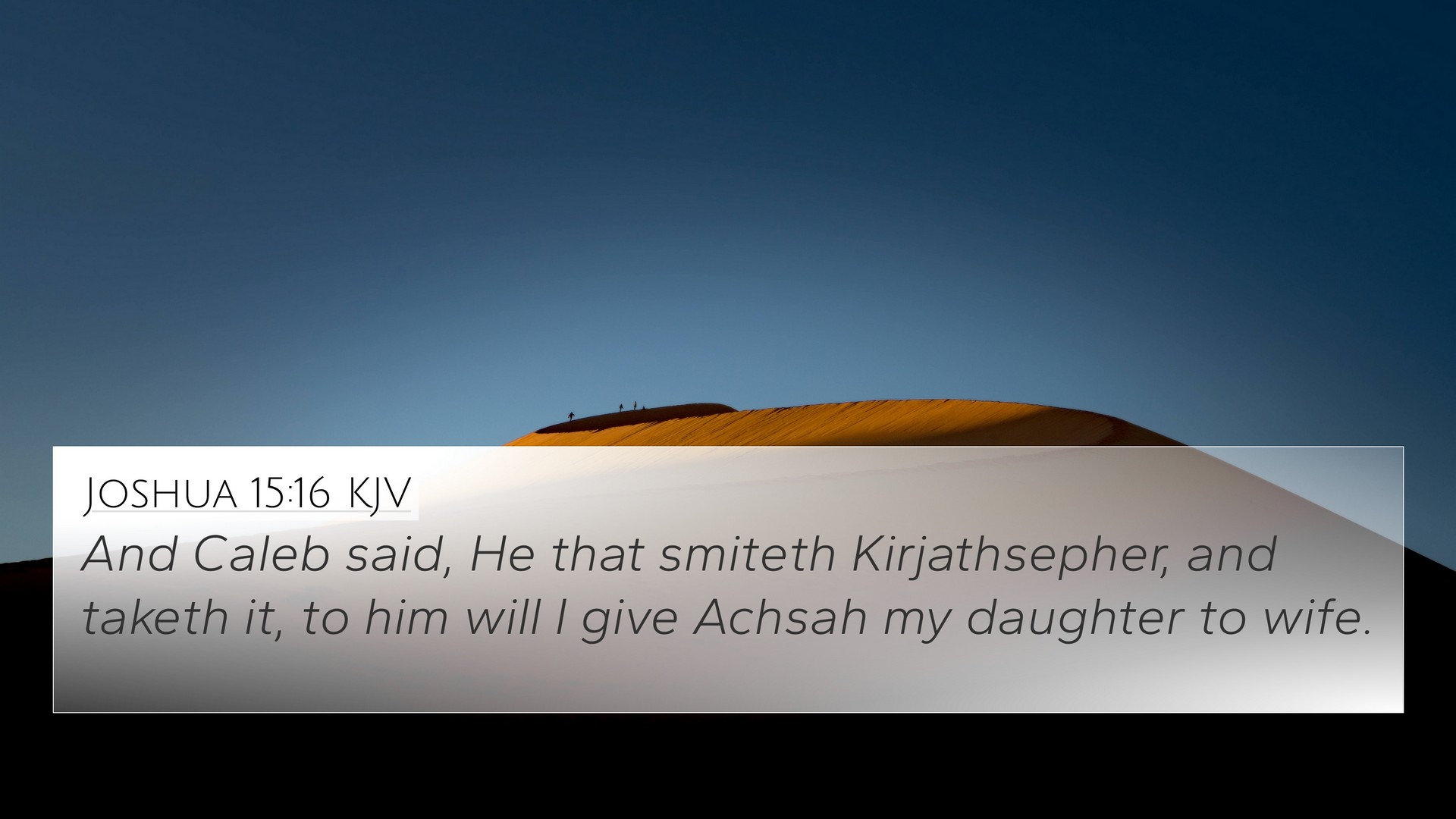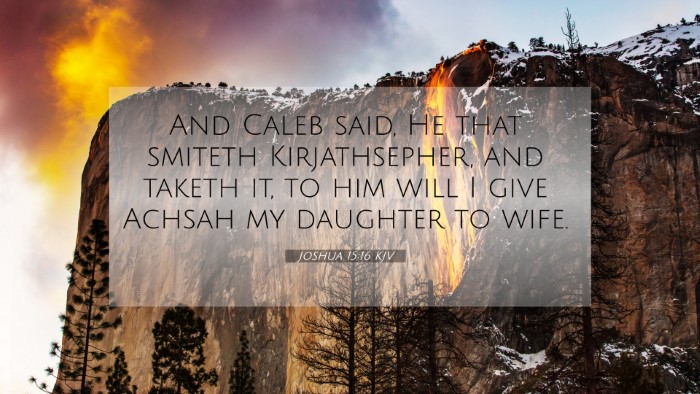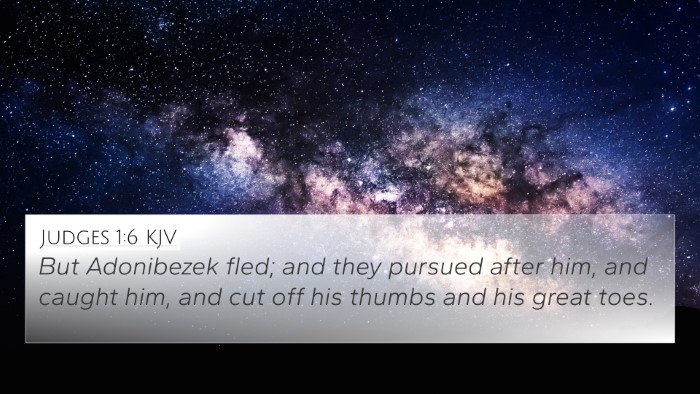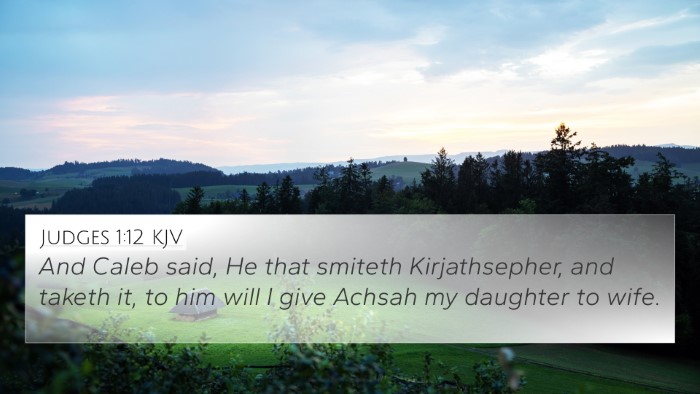Understanding Joshua 15:16
This analysis delves into the verse Joshua 15:16, exploring its meaning and significance through various public domain commentaries. Insights will be drawn from the works of Matthew Henry, Albert Barnes, and Adam Clarke, offering a comprehensive understanding of the scripture.
Bible Verse: Joshua 15:16
“And Caleb said, ‘Whoever attacks Kiriath Sepher and captures it, to him I will give my daughter Aksah as a wife.’”
Summary of Insights
Contextual Overview
Joshua 15:16 occurs within the narrative of the Israelites' conquest of Canaan. Caleb, a representative of faith and courage, promises his daughter in marriage to whoever is able to capture the fortified city of Kiriath Sepher. This offer displays both the seriousness of the challenge and the reward of valor.
Insights from Commentaries
-
Matthew Henry:
Henry emphasizes Caleb's faith and leadership qualities. He views Caleb as a model of courage, showcasing that both spiritual and physical battles are inherent in the life of faith. By proposing a reward for the city, Caleb instills motivation among his men, believing his lineage will benefit from a brave suitor.
-
Albert Barnes:
Barnes notes the significance of Kiriath Sepher and how its capture signifies a crucial military success for the Israelites. The city, likely Hebrew for "city of the book," reflects the unity of faith and military effort in fulfilling God’s promises. Barnes points out that Caleb's offer to marry off his daughter illustrates the intertwining of personal life with communal aspirations.
-
Adam Clarke:
Clarke elaborates on Aksah, Caleb’s daughter, and how her marriage symbolizes the continuity of faith in the family lineage. He discusses the shift from individual valor to collective achievement as families were raised to participate in God's covenant with Israel. The verse serves to illustrate generational faithfulness as part of the biblical narrative.
Related Bible Cross-References
This verse connects to several other Scriptures that elucidate themes of courage, reward, and familial ties in biblical history. Below are notable cross-references:
- Judges 1:12-13 - Details of Othniel's conquest over Kiriath Sepher.
- Numbers 14:24 - God's endorsement of Caleb for his faithfulness.
- Joshua 14:6-14 - Narration of Caleb claiming his inheritance due to his faith.
- 1 Chronicles 2:50-55 - Contextual family lineage leading to Caleb’s legacy.
- Luke 14:28-30 - The importance of counting the cost in endeavors, akin to military conquests.
- Proverbs 18:22 - The significance of finding a good wife, reflective of Aksah's role.
- Hebrews 11:32-34 - Acknowledgment of faith-driven victories in the Old Testament.
Thematic Analysis
The themes in Joshua 15:16 are rich, particularly in how they reflect on:
- Faithfulness: Caleb’s unwavering trust in God inspires others to act courageously.
- Reward: The promise of marriage signifies not just personal reward but the broader implications for the community and future generations.
- Family Legacy: The union of Aksah and her suitor represents a continuation of faith through family ties.
- Leadership: Caleb's leadership style motivates participation in communal goals, emphasizing communal rather than individual achievements.
Conclusion
In summary, Joshua 15:16 encapsulates vital dimensions of biblical themes—faith, reward, and community engagement. Through cross-referencing related scriptures, one can appreciate the layered meanings and the significant role of legacy in the unfolding biblical narrative.
Further Study
For those interested in deeper exploration:
- Engage with Bible concordance: Resources for identifying related themes in Scriptures.
- Utilize tools for Bible cross-referencing: Incorporating different Bible study methods to understand the connections between verses.
- Explore thematic Bible verse connections: Making sense of how various scriptures illuminate a single theological concept.




